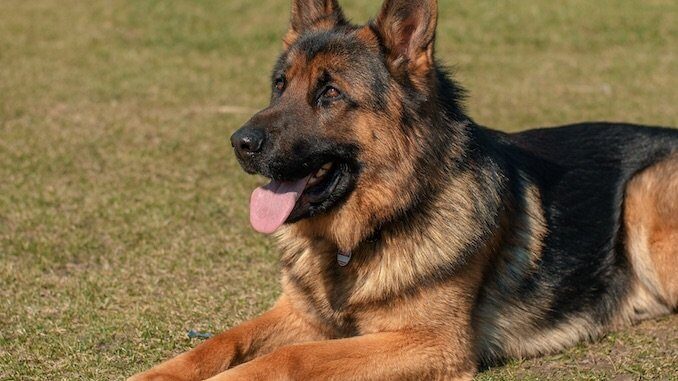
Have you ever dreamed of a dog that feels like a best friend and a protector rolled into one? That’s exactly how I felt when I first met a Shiloh Shepherd. This breed had me hooked from the moment I saw those soulful eyes and majestic stance.
Back when I was six, my parents brought home a rescue Labrador, sparking my lifelong love for dogs. Now, with my six-year-old English Bullmastiff, I’ve learned to appreciate the unique quirks of different breeds. But the Shiloh Shepherd? There’s something incredibly special about them that I can’t wait to share with you.
Imagine a dog that’s as smart as a whip, yet as gentle as a lamb. A companion that’s always ready for an adventure but just as happy to curl up on the couch with you. That’s the Shiloh Shepherd, and they’re unlike any dog you’ve ever known. Let’s dive into what makes these incredible dogs stand out from the pack.
TABLE OF CONTENTS
- Shiloh Shepherd Quick Breed Summary
- Origins of the Shiloh Shepherd
- Shiloh Shepherd's Physical Appearance
- Temperament of the Shiloh Shepherd
- Taking Care of a Shiloh Shepherd
- Training a Shiloh Shepherd
- The Most Common Health Concerns in Shiloh Shepherds
- Costs of Owning a Shiloh Shepherd
- FAQs: Get to Know the Shiloh Shepherd More
- So, Is the Shiloh Shepherd Right for You?
Shiloh Shepherd Quick Breed Summary
Origins of the Shiloh Shepherd
The Shiloh Shepherd is a breed with a fascinating history that intertwines the best traits of several remarkable dogs. From its roots in the beloved German Shepherd and the sturdy Alaskan Malamute, to the careful selection and breeding efforts of dedicated enthusiasts, the Shiloh Shepherd has emerged as a unique and extraordinary breed.
Parent Breeds: German Shepherd and Alaskan Malamute
The Shiloh Shepherd’s story begins with two remarkable parent breeds: the German Shepherd and the Alaskan Malamute. German Shepherds are renowned for their intelligence, loyalty, and versatility. Originally bred for herding sheep, they have become one of the most popular breeds worldwide, excelling in roles like police work, search and rescue, and as service animals.
On the other hand, Alaskan Malamutes bring a different set of strengths to the table. Known for their strength and endurance, these dogs were bred to pull heavy sleds across the harsh Alaskan terrain. With their friendly and affectionate character, Malamutes balance out the intense work ethic of the German Shepherd, contributing to the Shiloh Shepherd’s unique personality.
The Birth of the Shiloh Shepherd
The Shiloh Shepherd was developed by Tina Barber, a passionate dog breeder who wanted to create a dog that combined the best traits of the German Shepherd and the Alaskan Malamute. Her goal was to produce a breed that not only had the intelligence and versatility of the German Shepherd but also the gentle and friendly nature of the Malamute. This new breed was also intended to have a larger, more robust build.
Tina Barber’s vision led to the establishment of the Shiloh Shepherd dog as a distinct breed. She meticulously selected and bred dogs that met her criteria, focusing on temperament, health, and physical characteristics. Over the years, the Shiloh Shepherd has gained recognition for its exceptional qualities, becoming a beloved breed for families and individuals alike.
Expanding the Gene Pool: Other Influences
While the primary foundation of the Shiloh Shepherd is the German Shepherd and Alaskan Malamute, other breeds have also played a role in its development. To achieve the desired size, temperament, and health standards, breeders have occasionally introduced genes from other breeds such as the Canadian White Shepherd. These additions have helped enhance specific traits, like size and stability, ensuring the breed maintains its unique characteristics.
These hybrid influences were carefully selected and introduced with the goal of refining and stabilizing the breed. This careful and deliberate breeding process has made the Shiloh Shepherd what it is today: a dog that combines the best traits of its various ancestors into a harmonious and distinctive breed.
Shiloh Shepherd’s Physical Appearance
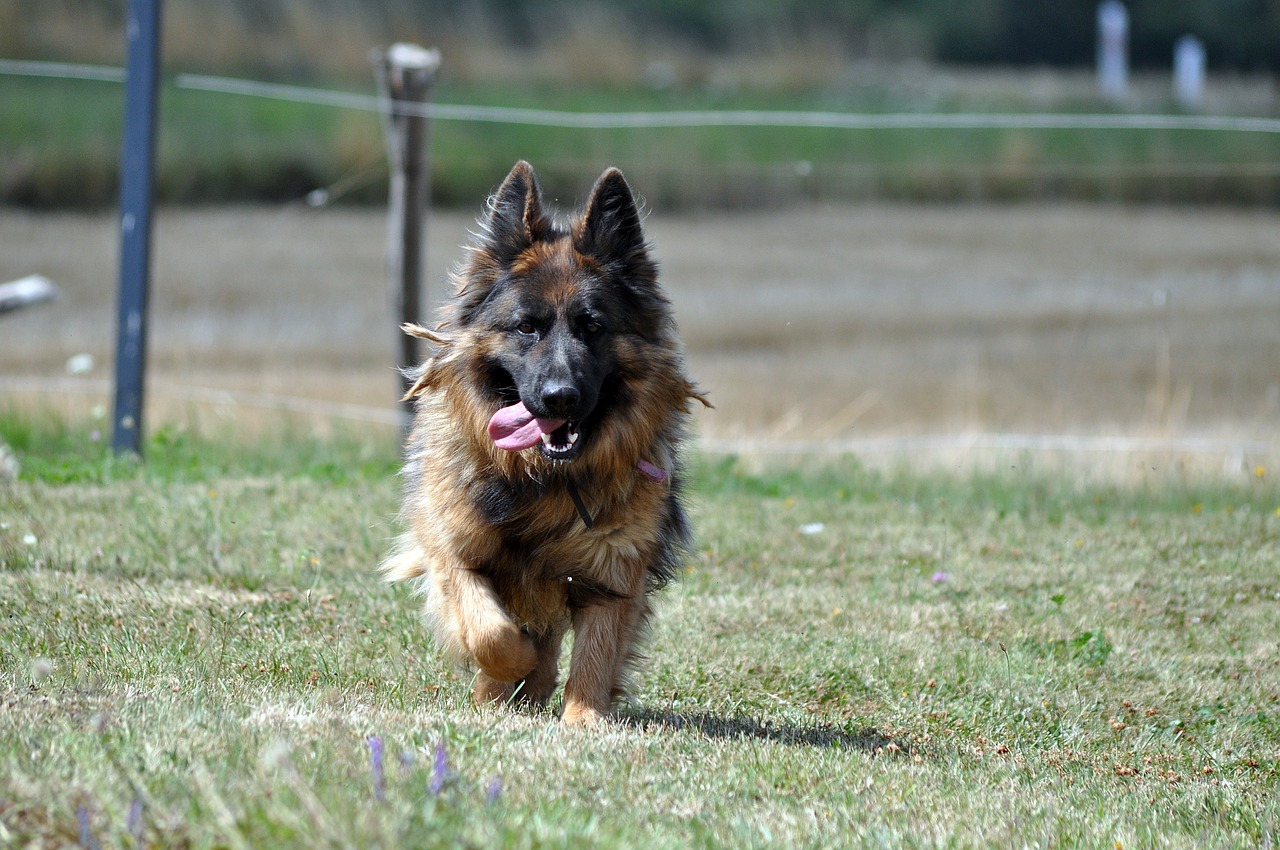
From Adobe Stock
When you first lay eyes on a Shiloh Shepherd, their majestic and powerful presence is undeniable. These dogs are not only impressive in size but also in their overall appearance. With a combination of strength, elegance, and a luxurious coat, the Shiloh Shepherd stands out in any crowd. Let’s explore the physical traits that make this breed so visually captivating.
Size and Build
The Shiloh Shepherd is a commanding presence with its large and sturdy build. These dogs stand tall, with males typically reaching heights of 28 to 30 inches and females slightly shorter at 26 to 28 inches. Their weight matches their height, with males weighing between 100 and 130 pounds, and females ranging from 80 to 100 pounds. Their frame is muscular yet graceful, combining strength and agility seamlessly. This robust structure gives them an impressive and majestic look that immediately catches the eye.
Coat and Color
One of the most striking features of the Shiloh Shepherd is its luxurious coat. These dogs boast a double coat that can be either plush or smooth, providing excellent protection against the elements. The plush coat is dense and soft to the touch, while the smooth coat lies close to the body, offering a sleek appearance.
Shiloh Shepherds come in a variety of colors, adding to their visual appeal. You can find them in shades of black and tan, golden, reddish-brown, and even silver. Some have striking sable patterns or bi-color markings, enhancing their already stunning looks. This rich diversity in coat colors and textures makes each Shiloh Shepherd unique.
Distinctive Features
In addition to their size and coat, Shiloh Shepherds have several distinctive features that set them apart. Their heads are broad with a well-defined stop and a strong, square muzzle. Their eyes, often a warm brown or amber, are expressive and intelligent, reflecting their gentle nature. Ears are medium-sized, standing erect, giving them an alert and attentive appearance.
Their tails are another notable feature, typically carried low with a slight curve at the end. When in motion, their tails often sway gracefully, adding to their elegant demeanor. Overall, the Shiloh Shepherd’s physical traits are a harmonious blend of power, beauty, and grace, making them a truly magnificent breed.
Temperament of the Shiloh Shepherd
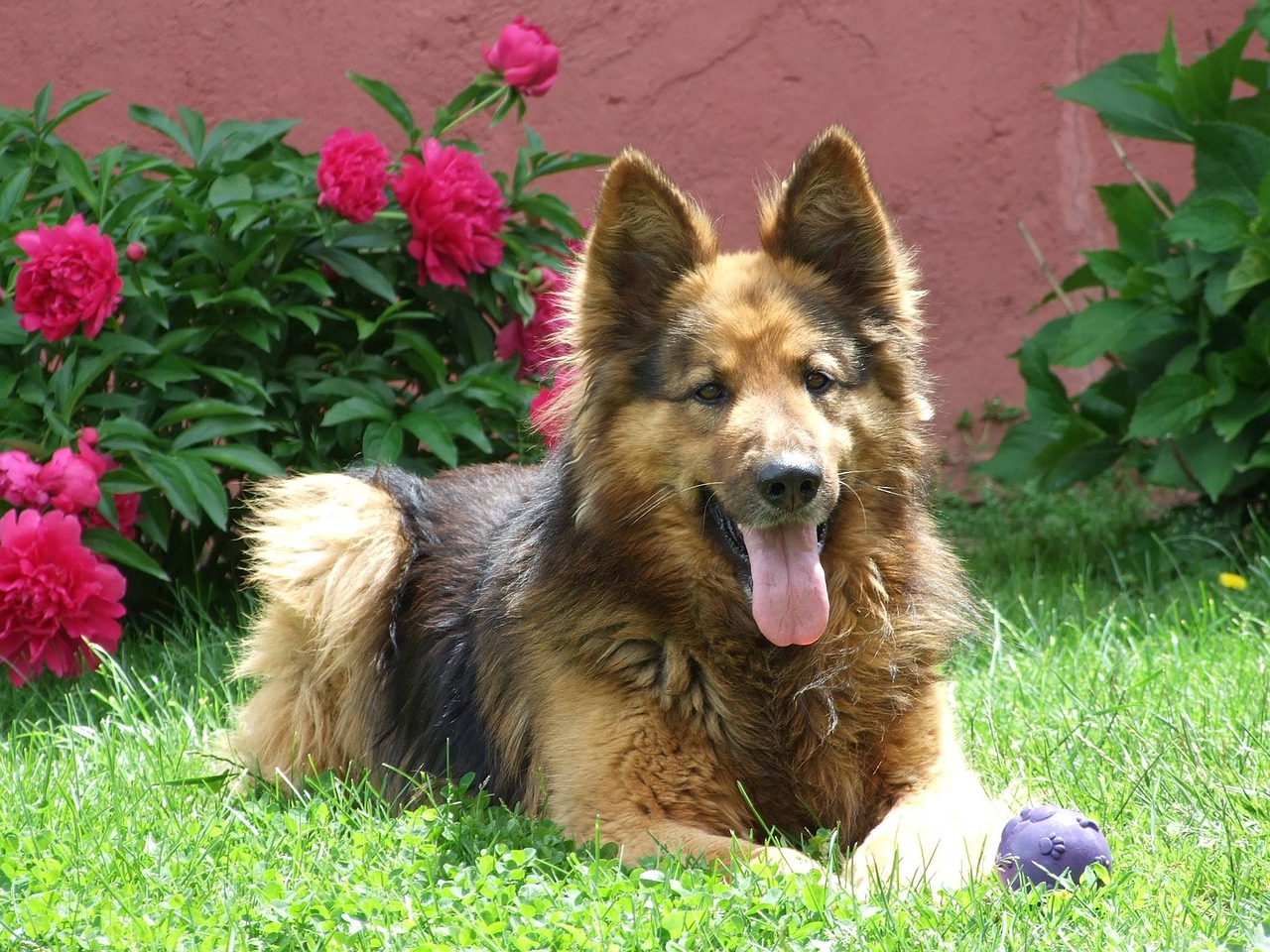
From Adobe Stock
Ever wondered what it’s like to live with a dog that’s not only a loyal companion but also a gentle giant? The Shiloh Shepherd might just be the perfect match. From their loving nature to their playful antics, these dogs bring a unique blend of traits that make every day a joy.
Friendly and Loyal Companions
When it comes to temperament, Shiloh Shepherds are some of the most loyal and friendly dogs you’ll ever meet. I remember the first time I interacted with one. Their gentle personality was immediately apparent. These dogs form strong bonds with their families, always eager to please and be near their loved ones. They thrive on companionship and are known for their affectionate demeanor. If you’re looking for a dog that will be your shadow, the Shiloh Shepherd fits the bill perfectly.
Their loyalty is unmatched. Shiloh Shepherds are protective without being overly aggressive, making them excellent guardians for your home. They have a natural instinct to watch over their family, ensuring everyone feels safe and secure. This protective streak, combined with their friendly disposition, makes them wonderful family dogs.
Intelligent and Trainable
Living with a Shiloh Shepherd is a joy, thanks to their intelligence and trainability. These dogs are smart, picking up commands and tricks with ease. Training sessions with my English Bullmastiff have taught me that patience and consistency are key, and the same applies to Shiloh Shepherds. They respond well to positive reinforcement and enjoy the mental stimulation that comes with learning new things.
Their eagerness to learn and please makes them versatile companions. Whether you want a dog that excels in obedience, agility, or even therapy work, Shiloh Shepherds can do it all. Their sharp minds and quick learning ability mean they thrive in environments where they are challenged and engaged.
Gentle Giants with a Playful Side
Despite their large size, Shiloh Shepherds are gentle giants. I’ve seen them interact with children, and it’s heartwarming to watch their careful and considerate behavior. They seem to understand their size and are always gentle, making them ideal playmates for kids. Their calm and patient personality means they can handle the excitement of a bustling household without becoming overwhelmed.
But don’t let their calm demeanor fool you. Shiloh Shepherds also have a playful side. They love to play fetch, go on hikes, and engage in any activity that involves their family. Their energy levels are moderate, meaning they enjoy both active playtime and lounging around the house. This balance makes them adaptable to various lifestyles, as long as they get enough exercise and mental stimulation.
Social and Well-Adjusted
Socialization is key to raising a well-adjusted Shiloh Shepherd. These dogs are naturally social and enjoy meeting new people and other animals. Early socialization helps them develop into confident and well-mannered adults. I’ve found that exposing them to different environments, sounds, and experiences from a young age makes a world of difference.
Shiloh Shepherds tend to be good with other dogs and pets, especially if they are raised together. Their friendly nature extends beyond their human family, making them great companions for other animals. With proper socialization and training, you’ll have a dog that is comfortable in various situations and settings, enhancing your overall experience of living with a Shiloh Shepherd.
Taking Care of a Shiloh Shepherd
Living with a Shiloh Shepherd dog is a rewarding experience, but it comes with its responsibilities. These magnificent dogs need proper care to stay happy and healthy.
Feeding
Quality matters just as much as quantity. These dogs thrive on a balanced diet rich in proteins, fats, and essential nutrients. Opt for high-quality dog food that lists meat as the first ingredient to ensure they get the best nutrition. A diet rich in protein supports their muscle development and overall health.
It’s crucial to tailor the amount of food to your Shiloh Shepherd’s age, weight, and activity level. An adult Shiloh Shepherd typically needs about 4 to 5 cups of food per day, divided into two meals. Puppies require more frequent, smaller meals to support their rapid growth. Always monitor their weight and adjust portions accordingly to prevent obesity, which is a common concern for large breeds.
Hydration is another key aspect of feeding. Ensure your Shiloh Shepherd has access to fresh water at all times. This is especially important after exercise and during hot weather. A well-hydrated dog is a healthy dog. Maintaining proper hydration helps support their overall well-being.
Grooming
Maintaining a Shiloh Shepherd’s coat requires regular grooming sessions. Their double coat, which can be either plush or smooth, needs consistent brushing to stay in top condition. Aim to brush your Shiloh Shepherd at least two to three times a week to reduce shedding and prevent mats and tangles. This also helps distribute natural oils, keeping their coat shiny and healthy.
Bathing should be done every few months, or more frequently if your dog gets particularly dirty. Use a gentle, dog-specific shampoo to avoid irritating their skin. Bath time can be a great bonding experience and an opportunity to check for any skin issues or parasites. Regular baths help keep your Shiloh Shepherd clean and comfortable.
Don’t forget about other grooming tasks. Regularly check and clean their ears to prevent infections, trim their nails to avoid overgrowth and discomfort, and brush their teeth to maintain good oral health. Incorporating these grooming habits into your routine ensures your Shiloh Shepherd looks and feels their best.
Exercise
Shiloh Shepherds are active dogs that require plenty of exercise to stay healthy and happy. Daily walks are essential, and you should aim for at least an hour of walking each day. These dogs love to explore, so varying your routes can keep things interesting for them. Regular exercise helps maintain their physical health and prevents behavioral issues that can arise from boredom.
In addition to walks, Shiloh Shepherds benefit greatly from activities that challenge their minds and bodies. Interactive toys, obedience training, and agility courses are excellent ways to keep them engaged. These activities provide physical exercise. They also stimulate their intelligent minds, making them well-rounded and content.
Outdoor adventures are another great way to meet their exercise needs. Shiloh Shepherds make excellent hiking companions, thanks to their stamina and love for the outdoors. Taking them on hikes or long walks in nature allows them to burn off energy and enjoy new environments. Ensuring they get enough exercise is key to their overall wellbeing and happiness.
Shiloh shepherds are easy to care for, but they need lots of exercise, mental stimulation, and attention. Feed these dogs nutrient-balanced kibble and take them on long walks daily.
Training a Shiloh Shepherd
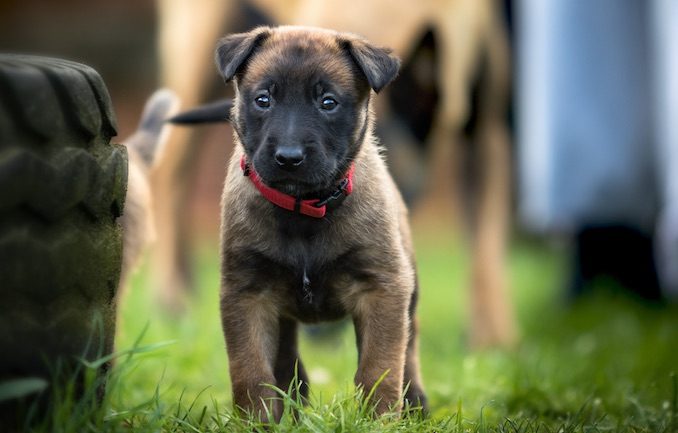
From Adobe Stock
These intelligent and eager-to-please dogs thrive on learning and working alongside their humans. From the early days of puppyhood to advanced training challenges, guiding a Shiloh Shepherd through the training process helps build a strong bond and a well-behaved companion.
Starting Early with Basic Training
Puppies are like sponges, soaking up new information quickly. Begin with basic commands such as sit, stay, and come. These foundational commands are essential for their safety and your sanity. I remember teaching my Bullmastiff these commands and how satisfying it was to see him respond.
Consistency is key in training. Use the same words and gestures for each command to avoid confusing your pup. Short, frequent training sessions are more effective than long, infrequent ones. Puppies have short attention spans, so keep sessions fun and engaging. Positive reinforcement, such as treats and praise, works wonders. Celebrate their successes, no matter how small.
Socialization is another crucial aspect of early training. Expose your Shiloh Shepherd to different people, places, and other animals. This helps them become well-rounded adults who are comfortable in various situations. Early socialization reduces the chances of fear-based behaviors and makes for a more confident dog.
Advanced Training and Mental Stimulation
Once your Shiloh Shepherd has mastered the basics, it’s time to move on to more advanced training. These dogs are highly intelligent and enjoy a challenge. Teach them more complex commands like fetch, roll over, and play dead. Advanced obedience classes can also be beneficial. Enrolling in these classes provides structure and new techniques to keep training interesting.
Mental stimulation is just as important as physical exercise for Shiloh Shepherds. Interactive toys, puzzle feeders, and games that require them to think are excellent ways to keep their minds sharp. Regular mental challenges prevent boredom and the destructive behaviors that can come with it.
Agility training is another great option for Shiloh Shepherds. These dogs excel in agility courses, which provide both physical exercise and mental stimulation. Setting up a simple agility course in your backyard can be a fun way to keep them active. Plus, it’s a fantastic way to showcase their impressive athletic abilities.
The Most Common Health Concerns in Shiloh Shepherds
These dogs have their own set of health concerns that owners should be aware of. Being informed about these potential issues helps ensure your furry friend stays healthy and happy throughout their life. Let’s take a closer look at some common health concerns for Shiloh Shepherds and how to manage them.
Hip and Elbow Dysplasia
Hip and elbow dysplasia are common concerns for large breeds, including Shiloh Shepherds. This condition occurs when the joints don’t develop properly, leading to arthritis and pain. I’ve seen this firsthand with larger breeds, and it’s crucial to monitor for any signs of discomfort or limping.
- Maintain a healthy weight through proper diet and exercise.
- Provide a balanced diet rich in nutrients that support joint health.
- Schedule regular vet check-ups to catch early signs.
- Consider supplements, physical therapy, or surgery if needed.
Bloat (Gastric Dilatation-Volvulus)
Bloat, or gastric dilatation-volvulus (GDV), is a life-threatening condition that affects deep-chested breeds like the Shiloh Shepherd. It occurs when the stomach fills with gas and twists, cutting off blood flow. This is a medical emergency, and immediate veterinary care is needed.
- Feed smaller, more frequent meals instead of one large meal.
- Avoid vigorous exercise immediately before and after eating.
- Use a slow feeder bowl to prevent rapid eating.
- Recognize signs of bloat: distended abdomen, unproductive vomiting, restlessness.
- Seek immediate veterinary attention if bloat is suspected.
Degenerative Myelopathy
Degenerative myelopathy is a progressive neurological disease that affects the spinal cord, leading to weakness and eventual paralysis in the hind legs. It’s similar to ALS in humans and is seen in breeds like the Shiloh Shepherd. Early signs include wobbling, difficulty standing, and dragging the hind legs.
- Early detection through genetic testing and regular vet check-ups.
- Physical therapy and mobility aids to maintain movement.
- Medications to manage symptoms.
- Genetic testing for breeding decisions and early intervention.
Hypothyroidism
Hypothyroidism occurs when the thyroid gland doesn’t produce enough hormones, leading to a slow metabolism. Common symptoms include weight gain, lethargy, and skin problems.
- Regular blood tests to monitor thyroid hormone levels.
- Daily medication to regulate hormone levels.
- Balanced diet and regular exercise to maintain a healthy weight.
Panosteitis
Often referred to as “growing pains,” panosteitis is an inflammation of the long bones in growing dogs. It’s a temporary condition but can be quite painful, causing lameness that shifts from leg to leg.
- Pain relief medication as prescribed by your vet.
- Rest and limited physical activity during flare-ups.
- Regular vet check-ups to monitor progress.
Exocrine Pancreatic Insufficiency (EPI)
EPI is a condition where the pancreas doesn’t produce enough digestive enzymes, leading to malabsorption and nutrient deficiencies. Symptoms include weight loss, diarrhea, and a ravenous appetite despite eating well.
- Pancreatic enzyme supplements added to meals.
- Special diet tailored to their digestive needs.
- Regular monitoring by a vet to adjust treatment as necessary.
Costs of Owning a Shiloh Shepherd
Bringing a Shiloh Shepherd into your family is an exciting adventure, but it’s important to be aware of the financial journey that comes along with it. These majestic dogs, with their loyal and loving nature, do come with a range of costs that every potential owner should consider. Let’s dive into the various expenses you’ll encounter, from the initial setup to the ongoing care required to keep your Shiloh Shepherd happy and healthy.
Initial Costs
When you first decide to bring a Shiloh Shepherd into your life, there are several initial expenses to consider. These costs can add up quickly, but they’re necessary to ensure your new companion has everything they need.
Initial Expenses:
- Purchase Price: $1,000 to $2,500 depending on the breeder and pedigree.
- Initial Vet Visits: $100 to $300 for vaccinations, health checks, and initial treatments.
- Spaying/Neutering: $200 to $500.
- Basic Supplies: $200 to $400 for essentials like a crate, bed, leash, collar, and toys.
Ongoing Costs
After the initial setup, there are regular expenses to consider. These costs will continue throughout your dog’s life and are crucial for maintaining their health and happiness.
Monthly Expenses:
- Food: $50 to $100 depending on the quality of the food and the size of your dog.
- Health Insurance: $30 to $60, which can help cover unexpected medical costs.
- Routine Vet Care: $300 to $500 annually for check-ups, vaccinations, and preventative care.
- Grooming Supplies: $20 to $40 monthly for brushes, shampoo, and other grooming necessities.
Additional Costs
Beyond the regular monthly expenses, there are other costs that may arise. These can vary widely depending on your lifestyle and your dog’s specific needs.
Occasional Expenses:
- Training Classes: $100 to $300 for a series of classes, which can be invaluable for socialization and obedience.
- Pet Sitting/Boarding: $20 to $50 per day if you travel and need someone to care for your dog.
- Emergency Vet Visits: $500 to $2,000 depending on the nature of the emergency.
- Specialized Equipment: $50 to $200 for items like harnesses, coats, or cooling mats for extreme weather conditions.
FAQs: Get to Know the Shiloh Shepherd More
How long do Shiloh Shepherds typically live?
Shiloh Shepherds usually have a lifespan of 10 to 14 years. With proper care, a healthy diet, and regular vet check-ups, they can enjoy a long, fulfilling life. Their longevity can vary based on genetics and overall health management.
Are Shiloh Shepherds good with children?
Yes, Shiloh Shepherds are known for their gentle and patient character, making them excellent canine companions for children. They are protective yet playful, often forming strong bonds with younger family members. Supervision is always recommended to ensure safe interactions.
Do Shiloh Shepherds get along with other pets?
Shiloh Shepherds generally get along well with other pets, especially if they are socialized from a young age. Their friendly and tolerant nature helps them coexist peacefully with other dogs and even cats. Proper introductions and gradual integration are key to harmonious relationships.
How much space does a Shiloh Shepherd need?
Shiloh Shepherds are large dogs that thrive in spacious environments. While they can adapt to apartment living, they do best in homes with a yard where they can move freely. Regular exercise and outdoor time are crucial for their physical and mental well-being.
What kind of climate is best for Shiloh Shepherds?
Shiloh Shepherds are versatile dogs that can adapt to various climates, but they thrive in moderate to cooler weather. Their double coat provides insulation against the cold, but they should be monitored for overheating in hot climates. Always provide plenty of water and shade during warm weather.
So, Is the Shiloh Shepherd Right for You?
Shiloh Shepherds are loyal, intelligent, and loving companions that can bring immense joy to the right household. Understanding their needs and ensuring you can meet them is crucial before making the commitment. If you fit the criteria for a Shiloh Shepherd owner, you’ll find these dogs to be rewarding, faithful friends for years to come.
Shiloh Shepherds Are For
- Active Individuals and Families: Shiloh Shepherds thrive in environments where they get plenty of exercise and mental stimulation. If you love outdoor activities, this breed will be a perfect fit.
- Experienced Dog Owners: Their size and intelligence make them more suitable for owners who have experience with large breeds and can provide consistent training and socialization.
- Homes with Space: These dogs need room to roam and play. Ideal homes include those with large yards or access to open spaces for regular exercise.
Shiloh Shepherds Are Not For
- Inexperienced Dog Owners: First-time dog owners might find the Shiloh Shepherd’s needs challenging without prior experience with large, intelligent breeds.
- Sedentary Lifestyles: If your lifestyle is more laid-back or sedentary, this energetic and active breed may not be the best match for you.
- Small Living Spaces: Apartments or homes without yards may not provide enough space for a Shiloh Shepherd to thrive, leading to potential behavioral issues due to lack of exercise.

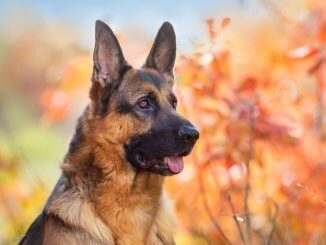
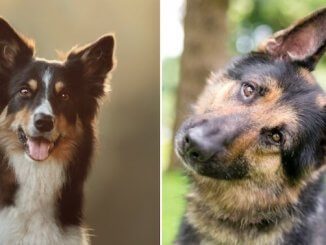
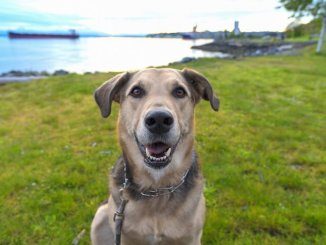
This is the best , most comprehensive description of our Shiloh puppy. I truly appreciate your writings .
There are several accredited breeders in Holland who continue to breed their dogs with dogs from American breeders and, of course, from within Holland as well. I am unaware of any other European breeders
Great article, very helpful. Unfortunately I live in the Uk and can’t find a UK breeder. Can anyone help please?
Hi Penny,
I’m glad you enjoyed the article! I’m not aware of any specific breeders who I would recommend in the UK. However, I have shared your comment so hopefully someone can share their recommendations with you.
Hi Penny,
I have had several Shilohs and they are truly the perfect dogs. Mine are my babies, so spoiled. Unfortunately you’re correct, most breeders are in the US, since that’s where Shilohs originated. I believe there are a couple breeders in Europe (I think the Scandanavian area, but don’t quote me on that). Research some breeders, and really do your research! People will sell fake “Shilohs” that have serious health problems even as puppies so be aware! When you find a reputable breeder you like, just reach out to them, we’re a small community and most breeders know each other across the US, and we LOVE talking about our pups! So don’t be shy to strike up a conversation. The best thing to do if you decide to get a Shiloh is fly to the breeder and pick up your puppy in person, then fly back with the puppy while they’re still small enough to make the in cabin plane standards. I normally don’t endorse flying pets, but that’s the safest way to go about it. Flying a puppy in cargo is never safe! If the cost of this is giving you pause, you may want to consider a different breed. These pups are expensive from initial purchase (mine were $1850), to high quality food, and vet bills. Take this into consideration as well. Be warned, if you get a Shiloh they will have you wrapped around their little paws at first sight and you’ll be a Shiloh mama for life! You’ll start to notice people get their own packs of Shilohs. They’re kind of like potato chips, I bet you can’t have just one ?. Also, there’s a FB group called Shiloh shepherd owners, I don’t know if they accept no-owners but you could message them and see if they have any ideas as well, many people on this group are Shiloh breeders so they could give you great feedback. I hope this helped, good luck!
Hi, my wife bought me a beautiful 2 month old German Shepherd, 3 years ago, only to find out that she is a Shiloh Shepherd. WOW. She fits the profile exactly. She is unbelievable. I love her like a person I am so proud of my baby girl. And now I am more proud to tell folks that she is a Shiloh Shepherd. Everyone thinks she is beautiful.
I have had several German Shepherds over my lifetime. Both as companion dogs and working dogs. Gave up on the breed as I have gotten older – 66 ! Just discovered the Shiloh Shepherd and think it might be a perfect fit for me now.